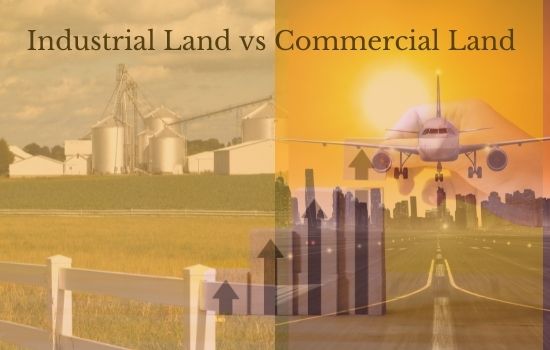Difference Between Industrial and Commercial Property: While purchasing or selling land, one might get confused with industrial and commercial land. However, these lands may sound similar, but in reality, they stand apart.
As far as zoning classification is concerned, commercial land covers most types of nonresidential property including restaurants, stores, banks, bars and the dry cleaning business etc., whereas, industrial designation implies something messier, like a factory, that needs to be set apart from residential zones.
Table of Contents
What is Commercial Property?
Commercial property is real estate that is intended for business activities. Broadly, it is a building that deals in businesses, and can also be referred to as land that is used to generate profit.
The commercial property has different:
- Zoning rules
- Financial terms
- Taxation
- Laws
Commercial property includes multi-family apartments, retail units and much more. The performance of commercial property depends on the location of the property, how accessible the property is, how well it is developed, etc.
What is an Industrial Property?
Industrial property refers to land that is used for industrial purposes. It includes small, large and enormous.
- Small industrial sites: These sites include single or double-storey buildings zoned for industrial use. These often have flexible interior space, usually a mix of warehouse and office space. These spaces are commonly used by businesses like mechanics, start-ups and laboratories.
- Large industrial sites: These sites include medium to large warehouses and factories that manufacture or store goods. They also include distribution companies such as third party logistics.
- Enormous spaces: Enormous industrial spaces are preferred by logistics and distribution companies that hold and distribute finished goods to stores and/or directly to customers.
What is the difference between industrial and commercial property?
Industrial and commercial are two different methods of business. While the average person may think that industrial and commercial zoning would be the same, given that they both involve non-residential land, this isn’t the case. The term “Industrial” refers to any venture or business that deals with the manufacturing of goods, whereas “Commercial” refers to any business or venture that is intended to gain profit. Another primary difference between these two types of land is zoning restrictions.
Commercially zoned areas are generally reserved for businesses that interact directly or indirectly with the public. These may include offices, retail stores, restaurants, bars, hotels and apartment complexes. Important factors in commercial zoning include:
- How much parking is available
- How close the establishment is to religious buildings
- How close are schools
Industrial zoning is commonly used for areas involving businesses, like manufacturing or packaging. Some common buildings in industrially zoned areas include storage facilities, plants and even airports. Industrial zoning is related to:
- How much noise the establishment is going to produce
- Environmental Concerns for the surrounding area
- How much land the buildings will take up.
Zoning restrictions if not considered appropriately can turn a simple real estate deal into a complex problem. Hence it is essential to seek experts who have a piece of complete knowledge of different zoning restrictions. Therefore, look nowhere else and contact LandSale4u. Our team of experts offer you multiple options in both commercial and industrial land along with zoning restrictions. We help in easing your paperwork and also provide you with the right financing options.
For more details visit: https://landsale4u.com
Surender Sharma
Land record is a generic term which is used to refer to a number of records. These include Records of Rights (RoRs), register of the lands, crop inspection register, tenancy, mutation register, disputed case register, and so on. Land record also includes certain geological information in regard to the land such as the shape and size of the land, type of soil on the land. It can also include the economic information in relation to the irrigation and crops.

